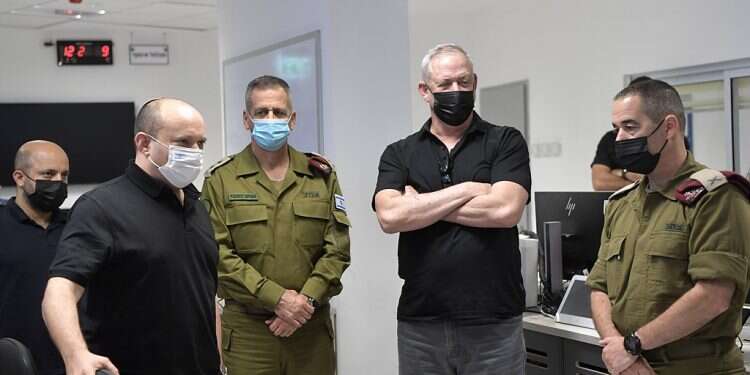Defense Minister Benny Gantz said Wednesday that he believes that a credible threat of an Israeli strike on Iran's nuclear facilities is the only way the Biden administration will be able to negotiate a better nuclear deal with Tehran.
Follow Israel Hayom on Facebook and Twitter
Israel contends its regional archrival Iran seeks nuclear weapons, citing the radical regime's repeated threats to annihilate the Jewish state. Tehran, however, insists its nuclear program is for peaceful purposes only.
Earlier this month, the International Atomic Energy Agency confirmed that Iran has accelerated its enrichment of uranium to near weapons grade, a move raising tensions with the West as both sides seek to resume talks on reviving Tehran's nuclear deal.
In a briefing for over 60 foreign ambassadors Wednesday, Gantz doubled down on the threat, saying that Israel "has the means to act and will not hesitate to do so – I do not rule out the possibility that Israel will have to take action in the future in order to prevent a nuclear Iran."
Tehran, he told the ambassadors, "intends to destroy Israel and it is working to ensure it has the means to do that. To that end, it is also working via its emissaries in Iraq, Yemen, Syria, Lebanon, and Gaza, using drones and precise missiles, acting against commercial ships in the sea, and even conducting cyberattacks around the world."

The Israeli defense minister further pointed out that intelligence suggests that Iran's defense budget has more than doubled in the past five years growing from the rial equivalent of $22 billion to the respective equivalent of $49 billion.
"Iran is just two months away from collecting the required materials for a nuclear bomb. We don't know if the Iranian regime is willing to return to the negotiating table, and the world must prepare a Plan B, and stop Iran's progress right now," Gantz asserted.
"At the end of the day, the goal is to reach an agreement that is 'longer, stronger, and broader.' Iran reaching the nuclear threshold places us on the brink of a regional – and potentially global – nuclear arms race," he warned.
He further stressed that "Israel has no conflict with the Iranian nation, only with the Iranian government."
In another warning, he said, "We in Israel have our own options. We've known how to use them in the past and I don't rule out that we might need to use them in the future. But Iran is first and foremost a challenge for the world, which needs to unite and act."
The defense minister's warning was echoed by remarks made Wednesday by IDF Chief of Staff Lt. Gen. Aviv Kochavi who – citing Iran's not-so-subtle progress toward weapon-grade uranium and the stalled negotiations between Washington and Tehran on the matter – said the military was stepping up its work on plans for a potential strike on Tehran's nuclear program.
At a special briefing with military correspondents, Kochavi said that "the progress in the Iranian nuclear program has led the IDF to speed up its operational plans, and the defense budget that was recently approved seeks to address this need."
He further hinted that a military operation was not the only tool in Israel's belt: "The IDF is operating constantly and in a variety of ways in order to minimize Iran's influence in the Middle East," Kochavi said.
The intensifying shadow war between the Jewish state and the Islamic republic with the two trading mostly what foreign media reports say are cyber-blows.
On the tactical level, the IDF has been fighting Iran's attempts to tighten its grip on the region via surrogates in Syria and Lebanon, which is home to Hezbollah – Tehran's most powerful proxy in the Middle East – and over the past two and a half years, the IDF has destroyed hundreds of Iranian assets in Syria.
Gantz and Kochavi's remarks come as Prime Minister Naftali Bennett is on his first official visit to Washington, where he will meet with US President Joe Biden, Secretary of State Antony Blinken and other top American officials.
According to Israeli media reports, as Israel and the US share close defense ties, the IDF has made this view known to the Pentagon, though the US is not actively involved in Israel's plans.
Subscribe to Israel Hayom's daily newsletter and never miss our top stories!




